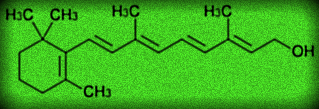vitamin A is important for vision
Vitamin A Vitamin B complex Vitamin C Vitamin D Vitamin E Vitamin K
Vitamin A, an essential organic compound, is an important nutrient required by the human body.
Vitamin A, in its four forms, is required in small quantities for the proper body functions like growth,
development, vision, integrity of epithelial cells, reproduction and immune functions.
The dietary requirements of vitamin A are normally met by
provitamin-A, carotenoids and
retinol.
The most easily useable form of this fat soluble vitamin is retinol derived mainly from retinyl ester.
Vision
There are two main functions for the vitamin A in the human body.
The vitamin A is vital for the retina in the eye.
The retinol is carried through the ocular tissue
to the retina and to the rod cells and rhodopsin, a pigment essential for low-light vision, is produced.
Night blindness is caused by inadequate supply of retinol. The deficiency of proteins and zinc also can contribute
to night blindness as they are essential for the regeneration of the pigment rhodopsin.

vitamin A molecule
Skin care
Vitamin A is helpful in all body tissues for their growth and health.
The deficiency of vitamin A affects the growth in epithelial cells.
Further the number of goblet cells also diminish with the resultant reduction of
mucous secretions.
Regeneration and cell differentiation of the surface cells is affected giving rise to their
flattening and accumulation of keratin.
These degenerative processes lead to xerophthalmia.
Immunity
A form of vitamin A called retinoic acid plays a vital role in the process of gene transcription.
The secretion of mucous and the cellular integrity depend on the vitamin A sufficiency.
The loss of both these factors decreases the resistance to diseases and immunity.
Vitamin A prevents shrinkage of thymus gland and shows anti-viral activity by gearing up
the white blood corpuscles in their responses to antigens.
Deficiency
Both adults and children can become deficient in vitamin A. New born with early weaning
can become deficient unless milk fortified with this vitamin or supplements are given.
Insufficient intake of this vitamin can result in low immunity, blindness, abnormalities in bone development,
growth retardation, hyperkeratosis and xerophthalmia.
Toxicity
Vitamin A being fat soluble, is stored in the body, on absorption.
Excess of vitamin A over a long period can result in jaundice, pains, nausea, joint pain, alopecia,
skin desquamation, liver damage and general debility.
Excess of this vitamin in pregnant women can affect the development of foetus.
Acne has been successfully treated with slightly higher doses.
No toxicity is encountered when vegetarian food rich in vitamin A is
consumed.
Care has to be taken when excess of animal food rich in vitamin A and vitamin supplements are taken.
Food sources of vitamin A
Vitamin A is rich in animal sources of food like eggs, liver, fish liver oils, dairy products and milk fat.
Coloured non citrus fruits, leafy vegetables, carrots and red pepper are good sources of vitamin A.
Google+ page
By Mahmood Syed Faheem
Advertisement
Disclaimer: Not professional advice - The above content is just for informational & educational purpose only If you need specific medical advice please seek a professional doctor who is licensed or knowledgeable in that area.